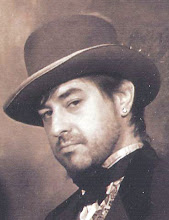Today, ghost hunting is at its all time high. You can't switch on the TV without running into some ghost-related show or log on to the computer without stumbling across a website promoting their ghost hunting expertise. With Hollywood movies ghost stories out to scare us and the media wanting to thrill us with stories of the unknown, it makes the viewers more and more curious as to the reality of what’s really going on in our paranormal universe.
I’ve been in the field of ghost hunting for over 20 years and I have personally seen all the changes. Gosh, in 2000 I would be considered lucky to stumble across someone willing to talk about ghosts! In most cases, folks didn’t open up too much on the idea or weren’t even willing to share their personal ghost encounters if they had one. Likewise the media wasn’t in too much of a hurry to cover the latest ghost encounter. SO... what happened to create the craze? How has it affected the general public and more specifically, the "old time" ghost hunters today? Let's travel back to 2004 to see if we can find an answer to the first question.
When the Sci-Fi channel was about to hit rock bottom, they opened the door to a young team of ghost hunters known as TAPS to start off a new line up. This was the stepping stone for a new media craze. Within a year the ghost phenomena took off. TAPS' first inquisitive glance into the unknown inspired numerous other individuals and TV networks to put together their own groups and programs. What could have been a combined, sincere effort to determine if there is life after death turned into a sideshow carnival. Hold on, boys and girls, as we take a ride on the Amityville Horror Revisited!
How do I and other long-time paranormal investigators view this trend? You would think we'd be grateful to have all this media attention and every Tom, Dick and Harry wanting to jump into the paranormal waters. Sure, the frenzy has opened more doors for those pursuing a better understanding of our shadowy friends, but it has also paved a way for failure. So steps in the angry ghost hunter.
Just because you have a EMF detector in hand and the camera ready to go, it does not make you a GHOST Hunter. I’m sorry, but too many folks are too eager to label themselves without really knowing what’s involved. Don’t get me wrong, it's great to see so many ready to enter the field. But you first have to know how to proceed. As it is, most people are running out there without a clue of what to expect or what to do if they make contact with a pulse-deficient denizen of the dark. It's like going deer hunting with a pork chop tied around your neck. You might find a deer, then again, a bear might find you.
Where are the protocols? The research? The education? We are seeing more and more groups popping up left and right that are just imitating what they see on TV. Of course we all know what’s on the boob tube must be the correct way. Come on folks, TV is made for our entertainment. There is so much that goes on behind the scenes of which the viewer has no clue. It’s such a lack of education at best and an inaccurate source of information at worst. All these shows are basically the same, "Lets throw some folks in a haunted location and wait for them to scream."
Where is the real training, education and research to the claims? What happened to supporting your evidence? Nowadays, with so many claiming a belief in ghosts, we are finding it takes less and less research and data to support ones' evidence. (If I have to explain away one more orb photo...) Does this make it right? More than ever we are finding a lack in supporting evidence. Ghost hunters today are not willing to do the work or don’t know how. In fact, we are finding more groups doing investigations with nothing more than just a camera and a recorder. Does this make you an investigator? To the logical, scientific mind, the answer is no.
I don't want to feel so angry, but it really frustrates me how much the ghost hunting community is willing to accept insubstantial evidence as proof positive to the existence of spirits and not question the resource it came from. It’s okay to be a believer, but let's not forget to keep a skeptical eye open as well. Don’t always believe what you see on TV, hear on the radio or read in a book. You will learn that the best way to face the world of paranormal research is to experience it for yourself, test the theories and research the possible phenomena. After they have been trained.
Where are the goals? The plan on what to do if they encounter something they can't explain away? The follow-through and documentation on their experiences? What benefit have they given or gained in the midst of their jumping at every knock and running from every cold breeze? Once they've gotten their thrill, I like to think they feel a bit let down. I hope that some of them will look beyond the goosebumps and understand that there really is something out there -- something they are disrespecting in their attitudes and actions.
Ultimately, I want to see more groups and investigators do more work, finding better ways to support their evidence and to be honest with the community and themselves.
Thursday, February 4, 2010
Subscribe to:
Post Comments (Atom)


No comments:
Post a Comment